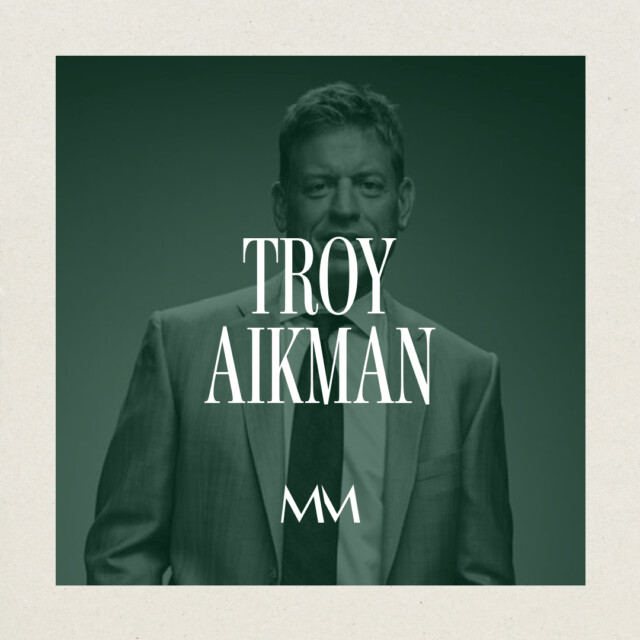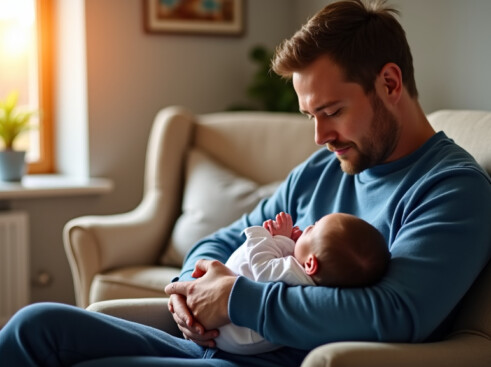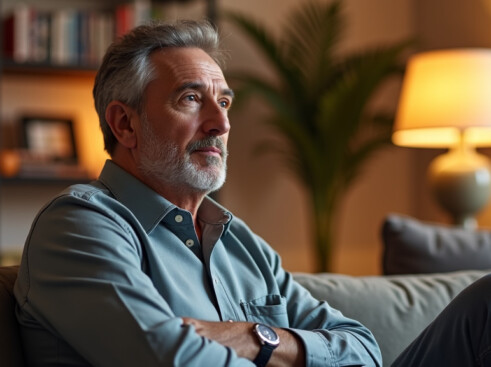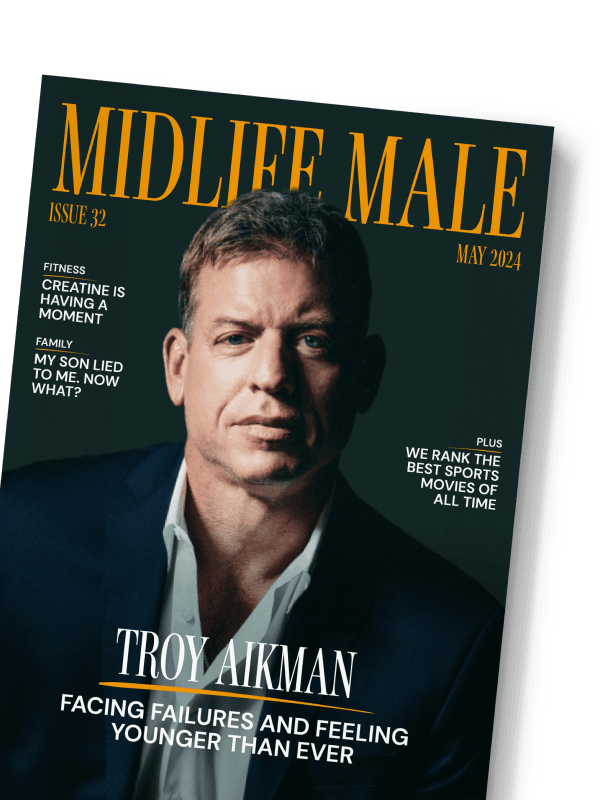I sat in my car outside the counseling office, my hands gripping the steering wheel as doubts and worries raced through my mind. Like many husbands, I wondered if seeking marriage counseling meant admitting defeat or showing weakness. That couldn’t be further from the truth.
The reality is that taking that first step toward counseling demonstrates incredible strength and commitment to your marriage. According to the American Psychological Association, about 75% of couples who participate in counseling see significant improvements in their relationship.
As someone who’s worked with countless couples, I’ve witnessed firsthand how counseling can transform relationships when husbands actively engage in the process. It’s not about pointing fingers or assigning blame – it’s about building a stronger foundation together.
I understand the hesitation. You might worry that a counselor will take sides or that exposing vulnerabilities could somehow diminish your role as a husband. These are natural concerns that many men share when considering marriage counseling.
What I’ve learned is clear: Taking this step isn’t a sign of failure — it’s an investment in your marriage’s future.
Overcoming Hesitations About Marriage Counseling
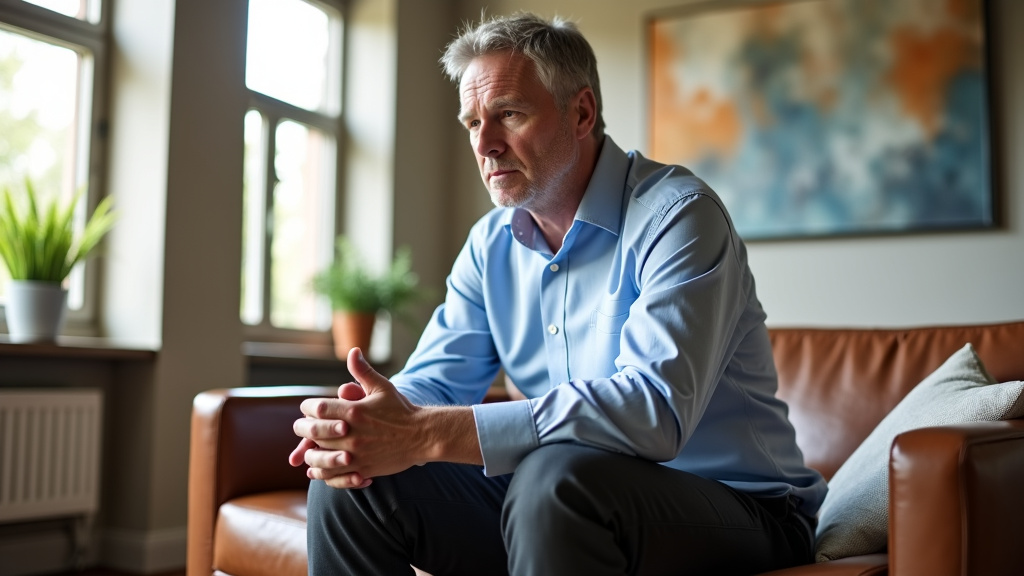
Many husbands experience natural anxiety when considering marriage counseling. According to a study by Dr. Psych Mom, men often feel particularly uncomfortable in therapy settings that focus primarily on verbal emotional expression.
A prevalent fear is being blamed or criticized during sessions. This concern often stems from the worry that both therapist and spouse might align against them, leading to feelings of defensiveness.
The prospect of sharing deeply personal issues with a stranger can feel especially daunting for many men. Traditional social conditioning often discourages men from emotional vulnerability, making it particularly challenging to discuss relationship struggles openly.
Understanding Male Communication Patterns
Men typically process and express emotions differently than women. While women often naturally gravitate toward conversation to work through issues, men tend to prefer action-oriented solutions or activities that minimize direct emotional discussion.
These distinct communication styles can make the therapy environment feel unfamiliar and uncomfortable. Many men worry about being pressured to communicate in ways that feel unnatural or facing criticism for their communication preferences.
The structured nature of counseling sessions can feel particularly challenging, as men often prefer side-by-side communication during activities rather than face-to-face conversations about feelings.
Addressing Common Misconceptions
Some husbands worry that counseling might worsen their situation by uncovering dormant issues. However, professional counselors are trained to guide couples through difficult conversations constructively, not create additional conflicts.
Another common misconception is that seeking help indicates relationship failure. In reality, couples who pursue counseling demonstrate commitment and strength in working to improve their relationship.
Many men fear being labeled with a problem or diagnosis. Professional marriage counselors focus on understanding interaction patterns between partners rather than assigning blame to individuals.
Moving Past the Hesitation
Starting with small steps can make the process more approachable. Many therapists offer initial phone consultations, enabling couples to build comfort with the counselor before committing to in-person sessions.
Marriage counseling centers on teamwork rather than fixing any single person. Both partners contribute to relationship dynamics, and counseling helps identify and improve these patterns collaboratively.
Finding the right therapist match is essential. Some men prefer working with a male counselor, while others benefit from therapists who specialize in helping couples where one partner feels uncertain about therapy.
Benefits of Marriage Counseling for Husbands
Effective communication in marriage often feels like speaking different languages, especially for husbands who struggle to express deeper emotions. Marriage counseling provides a structured, supportive environment where these barriers can be overcome.
I’ve witnessed countless husbands transform their relationships through professional guidance. One client remarked, “I was skeptical at first, but counseling gave me the tools to actually understand what my wife was trying to tell me all along.”
The strength of counseling lies in its ability to create a safe space where husbands can voice their concerns without fear of judgment. Consider when you last felt truly heard in your relationship.
Developing Better Communication Skills
In counseling, husbands learn to move beyond surface-level conversations and develop deeper listening skills. As noted in research on relationship dynamics, proactive questions help partners stay attuned to each other’s worlds.
Rather than immediately trying to fix problems, counseling teaches husbands to validate their partner’s feelings first. This simple shift often leads to breakthrough moments in understanding.
The skills gained extend beyond the counseling room, improving interactions at work and with family members. Learning to communicate effectively in marriage enhances all relationships.
Enhancing Emotional Intimacy
Many husbands struggle with emotional vulnerability, having been conditioned by society to keep feelings bottled up. Counseling provides tools to break down these walls safely and gradually.
Through guided exercises and professional support, husbands learn to identify and express their emotional needs clearly. This newfound emotional awareness leads to deeper connection with their spouse.
When both partners feel emotionally safe, physical intimacy naturally improves. The trust built through counseling creates a foundation for genuine closeness in all aspects of marriage.
Building Conflict Resolution Skills
Arguments are inevitable in marriage, but counseling equips husbands with strategies to handle disagreements constructively. Instead of escalating tensions, couples learn to address issues before they become major conflicts.
Through professional guidance, husbands discover their conflict triggers and develop healthier responses. This self-awareness prevents many arguments from occurring.
Most importantly, counseling helps couples establish fair communication rules that respect both partners’ needs. This framework ensures disagreements lead to understanding rather than resentment.
What to Expect in Marriage Counseling Sessions
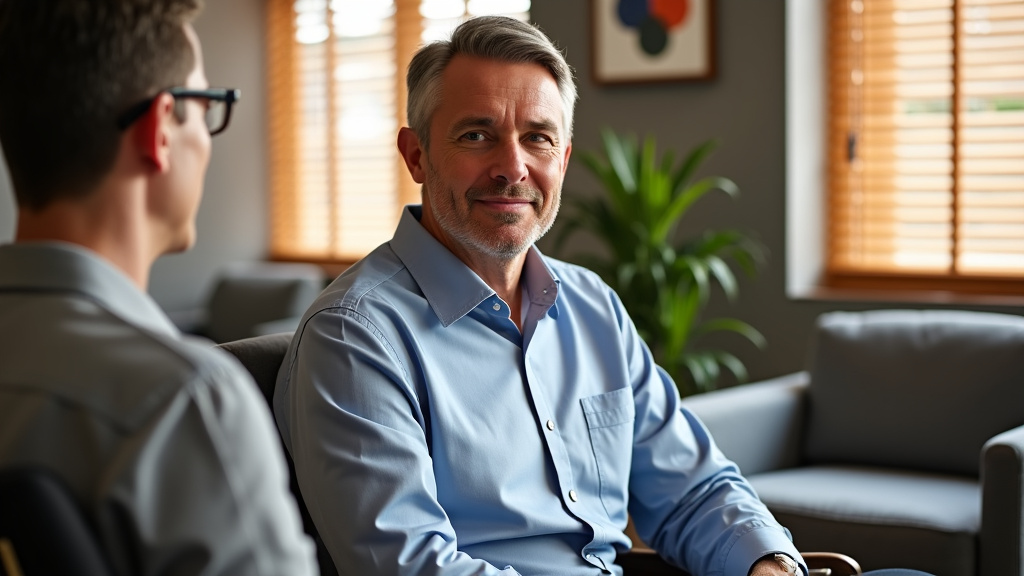
Marriage counseling creates a safe, neutral environment where couples can work through their challenges with professional guidance. According to research from the American Association of Marriage and Family Therapy, over 98% of couples report their counseling experience as positive.
The process begins with both partners meeting the counselor together to establish rapport and outline goals. During these initial sessions, you’ll have the opportunity to share your perspective on the relationship’s strengths and areas for growth.
Your counselor serves as an unbiased facilitator, helping both partners understand each other better while maintaining neutrality. They guide discussions while ensuring everyone feels heard and respected.
The First Few Sessions
During your first session, you’ll discuss what brought you to counseling and your hopes for the process. Your therapist will explore your relationship’s history and current challenges.
Both partners will have opportunities to share their views on the marriage, including its strengths and areas needing improvement. The counselor will observe your interaction and communication patterns.
Individual sessions may be scheduled, providing each partner space to speak freely about their concerns and experiences. These one-on-one meetings help the counselor gain deeper insight into each person’s perspective.
Working Through Issues Together
As sessions progress, you’ll learn practical communication techniques and conflict resolution strategies. Your counselor will help identify recurring patterns in your interactions that may create friction.
You’ll participate in therapeutic exercises designed to build trust and emotional connection. These may include structured conversations, role-playing, or homework assignments to practice new skills.
The counselor will guide you both in expressing needs and feelings more effectively while developing active listening skills. This process fosters deeper understanding and empathy.
Building New Skills
Throughout your sessions, you’ll develop tools for handling disagreements constructively. This includes learning to prevent arguments from escalating and finding effective ways to repair after conflicts.
Your counselor will help you identify triggers and emotional patterns, teaching healthier ways to respond when tensions rise. They’ll also guide you in expressing appreciation and maintaining positive connections.
Remember that progress takes time and commitment from both partners. Most couples see improvement within 8-12 sessions, though this timeline can vary based on individual circumstances and goals.
Strategies for Successful Engagement in Counseling
As a marriage counseling professional with over a decade of experience, I’ve noticed that husbands who approach therapy with genuine openness achieve significantly better outcomes. The journey isn’t always comfortable, but the rewards of committed engagement are transformative.
The foundation of successful counseling engagement begins with emotional honesty. When husbands allow themselves to be vulnerable and share their authentic feelings, they create opportunities for meaningful breakthroughs that reshape relationship dynamics.
One of my most successful cases involved a husband who initially resisted therapy but made a conscious decision to fully commit to the process. His willingness to actively participate in exercises and openly discuss difficult topics transformed his 15-year marriage from the brink of divorce to a thriving partnership.
Active Participation Strategies
The most effective way to engage in counseling is through active listening and participation. When your therapist poses questions or suggests exercises, embrace the process rather than taking a passive role. Research shows that couples who actively engage see significantly better outcomes.
I encourage husbands to take notes during sessions and review them between appointments. This simple practice helps retain insights and demonstrates commitment to your partner and the counseling process.
Consider homework assignments as opportunities for growth rather than burdensome tasks. Whether practicing communication techniques or completing reflection exercises, these take-home activities reinforce the skills learned in session.
Implementing Changes in Daily Life
The real work of counseling happens outside the therapy room. Make a conscious effort to apply the strategies and tools you learn during sessions in your daily interactions.
Create dedicated time each day to practice new communication skills with your partner. Even 15 minutes of focused connection using the techniques learned in counseling can strengthen your relationship.
Remember that change takes time and patience. Don’t get discouraged if you don’t see immediate results – meaningful transformation happens through consistent effort and practice.
Maintaining Long-term Engagement
Successful counseling requires sustained commitment beyond the initial sessions. Keep a journal to track your progress and identify areas where you still need growth.
Share your counseling journey with trusted friends who can provide support and accountability. Having outside encouragement helps maintain motivation during challenging periods.
Be proud of taking this step to improve your relationship. Your willingness to engage in the counseling process demonstrates strength and commitment to creating a healthier partnership.
| Strategy | Details |
|---|---|
| Meet Clients Where They Are | Understand that recovery is not linear and adjust strategies based on the client’s stage in the change process. |
| Embrace Cultural Humility | Engage in self-reflection and learn from clients about their unique experiences to build trust and rapport. |
| Empower Clients Through Collaboration | Enhance motivation by involving clients in shared decision-making and goal-setting. |
| Focus on Strengths | Utilize a strength-based approach to shift focus from deficits to resources and build a positive therapeutic alliance. |
| Leverage Technology | Use telehealth services and mobile apps to keep clients connected and engaged. |
| Build a Sense of Community | Connect clients to group counseling sessions or peer networks to provide support and accountability. |
| Integrate Gratitude Practices | Encourage clients to reflect on gratitude to boost emotional well-being and foster a positive outlook. |
Navigating Common Challenges in Marriage Counseling

When husbands enter marriage counseling, they often encounter a significant barrier – defensiveness. This protective response surfaces when men feel their competence or character is being questioned, making it difficult to engage meaningfully in therapy.
Defensiveness manifests in several ways, from immediately countering a partner’s concerns with excuses to deflecting blame. According to research from The Gottman Institute, this reaction, while natural, often escalates conflicts rather than resolving them.
The struggle to express emotions presents another significant hurdle for many husbands in counseling. Years of cultural conditioning around masculinity and vulnerability can make it challenging to articulate feelings beyond anger or frustration.
Breaking Through Defensive Patterns
The key to overcoming defensiveness lies in recognizing it as a fear response rather than a character flaw. When you feel that familiar tension rising, pause and take a deep breath before responding.
Practice active listening by focusing entirely on understanding your partner’s perspective rather than preparing counterarguments. This approach can transform confrontational moments into opportunities for genuine connection.
Remember that accepting responsibility for your part in conflicts doesn’t diminish your worth as a person. Instead, it demonstrates emotional maturity and strength of character.
Developing Emotional Fluency
Learning to express emotions more freely begins with building your emotional vocabulary. Start by noting how you feel throughout the day, identifying and naming those sensations and reactions.
Consider keeping a private journal where you can explore your feelings without judgment. This practice develops the language and self-awareness needed for more meaningful conversations in therapy.
Share your journey with your partner, acknowledging that while this process feels uncomfortable, it matters to you. Your willingness to be vulnerable can inspire deeper intimacy and understanding.
The Role of Individual Therapy Alongside Marriage Counseling
Marriage counseling provides couples with valuable tools for improving their relationship, but sometimes the path to a stronger marriage requires additional personal work. I’ve seen firsthand how combining individual therapy with couples counseling creates transformative effects that surpass what either approach could achieve alone.
Individual therapy offers a private space for deep self-exploration that’s not possible in couples sessions. While couples therapy focuses on relationship dynamics, individual sessions allow each partner to examine their emotional patterns, past traumas, and personal challenges affecting the marriage.
According to research from the Wildflower Center for Emotional Health, this dual approach accelerates progress in both individual growth and relationship healing. When partners work on themselves separately while attending couples sessions, they bring newfound self-awareness and emotional regulation skills to their shared therapeutic journey.
Personal Growth Benefits That Strengthen Your Marriage
Through individual therapy, you’ll develop deeper self-awareness about your contribution to relationship patterns. This insight helps you take ownership of your role rather than focusing solely on your partner’s behaviors or shortcomings.
Individual sessions provide a safe space to process difficult emotions and experiences that might be too raw or complex to address initially in couples therapy. You can work through personal insecurities, childhood wounds, or past relationship traumas at your own pace.
The individual therapy room serves as a space for developing better emotional regulation and communication skills. You can practice new ways of expressing needs and boundaries before implementing them in your relationship.
How Individual Growth Enhances Couples Work
When both partners commit to personal growth alongside their couples therapy journey, their shared sessions become more productive. They arrive with greater emotional awareness and better skills for engaging in difficult conversations.
Individual therapy helps each person identify and work through their triggers and reactive patterns. This self-knowledge makes it easier to stay present and engaged during challenging moments in couples sessions rather than becoming defensive.
Partners who’ve done individual work typically demonstrate more empathy and understanding toward each other. They’re better equipped to listen without judgment and validate their partner’s experiences, even when they differ from their own.
Creating a Balanced Approach
While pursuing both individual and couples therapy may seem like a significant commitment, the combined impact leads to more sustainable positive changes. Consider it a comprehensive wellness plan for your marriage.
The key is maintaining open communication between all therapists involved, with appropriate privacy boundaries in place. Your individual therapist can collaborate with your couples counselor to ensure both types of work remain aligned and complementary.
Remember that seeking individual therapy doesn’t mean there’s something wrong with you or your marriage. Instead, it demonstrates a deep commitment to personal growth and relationship health – one that can ultimately strengthen your bond in profound ways.
Embracing the Journey of Marriage Counseling

Seeking marriage counseling takes tremendous courage, particularly for husbands who may feel hesitant about opening up emotionally. According to the American Psychological Association, around 75% of couples who participate in counseling see significant improvements in their relationship.
Choosing to engage in therapy demonstrates a powerful commitment to both personal growth and the health of your marriage. Rather than viewing counseling as a last resort, consider it an investment in building a stronger emotional foundation with your partner.
The benefits of embracing the counseling process extend well beyond improved communication. Many couples discover deeper intimacy, renewed trust, and a more profound understanding of each other’s needs and perspectives.
Personal growth plays an essential role in this journey. As you learn to express yourself more openly and listen more attentively, you develop valuable skills that enhance your marriage and all your relationships.
While the path through counseling may feel challenging at times, remember that temporary discomfort often leads to lasting positive change. Each step forward brings you closer to the fulfilling relationship you and your partner deserve.
